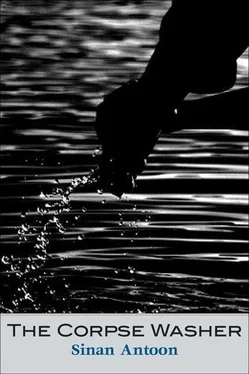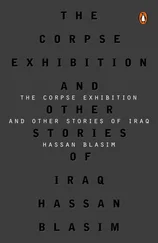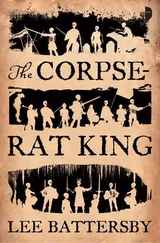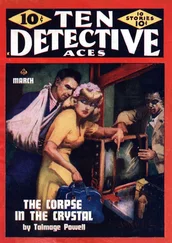I looked into my mother’s coffee-colored eyes. In a hushed voice, I asked, “Why is this man crying?”
She put her index finger on her lips to shush me and whispered, “Don’t be rude, Jawad!”
I craned to the left, curious to see what was happening inside. It was the first time my mother had taken me to my father’s place of work. He usually took the sufurtas with him in the morning, but that day he had forgotten to bring it along.
The narrow walkway led to a wide room with a high ceiling.
Three or four men were standing at its entrance with their backs blocking the scene. Were they watching my father as he worked? The street was quiet and although the walkway was long, I could hear the sound of water being spilled, with my father’s voice muttering phrases I couldn’t understand, except for the word “God.”
My mother knocked at the open door with more force and determination this time and then called out “Hammoudy.” None of the men turned around. Then the one standing to the far left moved aside and Hammoudy’s face appeared. He limped to the door. Hammoudy, my father’s assistant, looked older than his actual age. He had black hair and eyelashes as thick as a paint brush. He wore blue shorts and a white T-shirt which was wet in many spots. After exchanging a quick hello, my mother gave him the sufurtas and the bread saying: “Here, Hammoudy, this is Abu Ammoury’s lunch. He forgot to take it.”
He thanked her and rushed back inside after shutting the door. She held my hand again and we started to make our way back home. I turned back to look at the squatting man. His head was still in his hands. My mother shook me and said, “Mind where you’re going. You’re going to trip and fall.”
At that age I didn’t know much about my father’s work. All I knew was that he was a mghassilchi, a body-washer, but this word was obscure to me. I was afraid that day and asked my mother: “Does Father hurt people?”
“No son, not at all. It’s quite the opposite. Why do you ask?”
“But wasn’t that man there crying?”
“Yes, but not because of your father. He’s just sad.”
“Why is he sad? What are they doing inside?”
“Your dad washes the bodies of the dead. It’s a very honorable profession and those who do it are rewarded by God.”
“Why does he wash them? Are they dirty?”
“No, but they must be purified.”
“And where do the dead go after they die?”
“To God. Your father tends to them before they are buried.”
“How can they go to God if they are buried?”
“The soul rises to the sky, but the body remains in the earth it came from. It is said that we are come from Adam and Adam is of dust.”
I looked up to the sky. There were five clouds huddled together and I wondered: Which one will carry the dead man’s soul? Where will it take it?
The only time I ever saw my father cry was many years later when he heard that my brother Ameer, whom we called Ammoury, had died. Ameer, who was five years my senior, was transformed from “Doctor” into “Martyr.” His framed black-and-white photograph occupied the heart of the main wall in our living room and even a bigger part of my father’s heart, which Ammoury had already monopolized. Ameer, you see, was the ideal son who had always made my father proud. He always excelled and was the top of his class. At the national baccalaureate exams, his score was 95 percent, which enabled him to go to medical school to study to become a surgeon. Ameer wanted to fulfill his dream of opening a clinic so he could allow Father to retire. Father insisted that he would keep working until he died. Ameer insisted on helping Father at work even on his short leaves from the army during the years of war with Iran. This was before he was killed in the al-Faw battles.
I was reading in my room on the second floor when I heard a car stop in front of the house and doors being slammed shut. Seconds later, I heard the new doorbell ringing — the doorbell Ameer had bought and installed after the old one had stopped working and I had procrastinated about fixing it. I drew the curtain open and saw a taxi with a flag-draped coffin on top of it. My heart sunk into an abyss.
Whenever I saw a taxi driving down the street with a flag-draped coffin on it, the thought would cross my mind that Ammoury might one day return like this, but I would quickly cast the vision aside. I rushed down the stairs barefoot. When I reached the front door my mother was already out in the street in her nightgown without her abaya. She stood next to the taxi, beating her head, staring at the coffin and screaming “Oh my … Ammoury … Ammoury … Ammoury’s gone … My son is gone.”
A uniformed man stood there observing the scene. He asked me to sign the papers confirming receipt of the body. Without so much as a glance at the papers, I signed two copies with the ballpoint pen he gave me. I handed back the papers and the pen. He returned the pen to his pocket and said, “May God have mercy on him. My condolences.” He gave me a sheet of paper which I folded and put in my shirt pocket.
The neighbors had come out of their houses after hearing my mother’s wailing. Some of them stood around the taxi and a number of women rushed to console my mother and join in her wailing. The bald taxi driver had untied the ropes which secured the coffin on top of the metal rack. He put them in his trunk and stood waiting. I went up to my mother to hug her, but she was hysterical and surrounded by women who had started beating their heads as well. I wondered how my father’s weak heart would take the news.
The driver started moving the coffin around, as if to hint that we were to help him. I heard a voice saying “Go to Abu Ammoury’s place and inform him.” I yelled out that I would tell him myself after we brought down the coffin. The driver and I and some of the young neighborhood men lifted the coffin and brought it inside the house, placing it in the living room.
A silent tear fell on my cheek as I rushed to deliver the news of Ammoury’s death to my father. Ammoury, who used to play soccer with me on the street. Ammoury, who one summer had taught me how to make a paper kite using twigs from palm trees and who had climbed the neighbor’s palm tree to retrieve my kite when it got stuck there. Ammoury, with whom I shared a room for twenty years and who used to snore sometimes. Ammoury, who had caught me masturbating in the bathroom once when I forgot to lock the door and who had apologized, smiled, and quickly closed the door. He told me later that it was a natural desire, but said I shouldn’t overdo it. Ammoury, who gave me his blue twenty-four-inch bike when he became taller and bought a twenty-six. Ammoury, who used to race me and would always let me win at the end. Ammoury, who had kept my secret and agreed to go to the high school headmaster instead of my father to persuade him to allow me back to classes after I had been absent too many times. Ammoury, who had genuinely tried to understand my artistic tendencies and my decision to study sculpture and who truly respected art even though it was really not his thing. Ammoury, who had wanted me to be an engineer or a doctor like him and who couldn’t hide his disappointment when I scored 87.7 percent on the baccalaureate exams. It was enough to enter the Academy of Fine Arts, but that wasn’t his hope for his little brother. Ammoury, who used to stand by me at home, defending my point of view against my parents’ criticisms and who would tell them I was talented and had to choose my own path and take responsibility for my decisions. Ammoury, who had visited the exhibition we had during our second year at the academy to encourage me and who had asked me to explain the idea behind my piece and expressed his admiration, listening attentively. Ammoury, who used to joke with me thinking he was encouraging me, but who actually annoyed me, by saying that my statues would one day populate the squares of Baghdad.
Читать дальше












